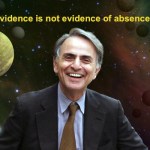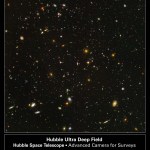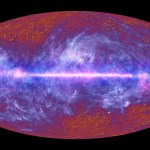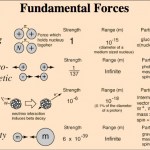Theory
"Never waste your time trying to explain who you are to people who are committed to misunderstanding you." -Dream Hampton
Perhaps no word in the English language generates as much misunderstanding as the word theory. In scientific circles, this word has a very specific meaning that's different from everyday use, and -- as a theoretical astrophysicist myself -- I feel it's my duty to help explain exactly what we mean when we use it. In this week’s Ask Ethan column, I'm pleased to pull out of our question/suggestion box the question of Ripley, who asks:
I often see that…
"I think one of the reasons that we like conspiracy theories is I think that we like to feel like there is a group of people who are so smart and powerful that they can pull the wool over an entire country or in fact even an entire world's eyes. That certainly makes us feel like somehow we're protected, even if it's not in our best interest." -Jason Ritter
Everyone knows one: the friend-or-relative who simply can't believe that things are the way they are, that someone's out to get them, trick them, or con them in some way. It's where my sympathies for Todd Snider came to a screeching halt…
Farnsworth: "There is it. The edge of the Universe!"
Fry: "Far out. So there's an infinite number of parallel Universes?"
Farnsworth: "No, just the two."
Fry: "Oh, well, I'm sure that's enough."
Bender: "I'm sick of parallel Bender lording his cowboy hat over me!" -Futurama
Our existence here in this Universe is something that we know is rare, special, beautiful, and full of wonder.
Image credit: Kelly Montgomery.
Some things happen with amazing regularity and predictability: the occurrence of days-and-nights, the tides, the seasons, the motion of the heavenly bodies, and so much more. The…
"There could be no fairer destiny for any physical theory than that it should point the way to a more comprehensive theory in which it lives on as a limiting case." -Albert Einstein
Imagine: you've worked hard all your life, through your primary and secondary school education, where you worked hard to get into a good college, through your undergraduate degree, where you found something you were passionate enough about that you wanted to study it even further, and then through graduate school, where you spent half-a-decade or more immersing yourself, non-stop, in an area of research in a field…
"Scientific discovery and scientific knowledge have been achieved only by those who have gone in pursuit of it without any practical purpose whatsoever in view." -Max Planck
Tomorrow morning, at 8 AM my time, the press conference that cosmologists have spent the past decade waiting for will finally happen, and the Planck satellite -- the most powerful satellite ever to measure the leftover radiation from the Big Bang -- will finally unveil its results about the origin and composition of the Universe.
Image credit: ESA / LFI and HFI Consortia.
They've figured out how to subtract the…
In my career (such as it is), I keep running into a hurdle having to do with the great value placed in the arts/humanities on the novelty of interpretations. Time and again, reviewers will say that my work tackles interesting questions in a methodologically competent manner using solid data – but that my interpretations (humanities people aren't comfortable with calling them “results”) aren't novel enough.
This makes no sense to me. I don't aim to produce a new interpretation. Nor do I wish to retain an old one. I just want to find the most-likely-to-be-correct answer to the question, given…
"When I say, 'I love you,' it's not because I want you or because I can't have you. It has nothing to do with me. I love what you are, what you do, how you try. I've seen your kindness and your strength. I've seen the best and the worst of you. And I understand with perfect clarity exactly what you are." -Joss Whedon
I bet you love science; practically all of us do, whether we realize it or not. As children, we all live as scientists, born with no knowledge or experience of this world, but with inherent ability to learn and adapt.
Image credit: ©2005-2013 ~cchhrriissttaa, of deviantART…
“I asked the Zebra,
are you black with white stripes?
Or white with black stripes?
And the zebra asked me,
Are you good with bad habits?
Or are you bad with good habits?
Are you noisy with quiet times?
Or are you quiet with noisy times?
Are you happy with some sad days?
Or are you sad with some happy days?
Are you neat with some sloppy ways?
Or are you sloppy with some neat ways?
And on and on and on and on and on and on he went.
I’ll never ask a zebra about stripes...again.” -Shel Silverstein
When it comes to the classical world -- the world on a macroscopic scale -- we all feel comfortable…
"Prediction is very difficult, especially if it's about the future." -Niels Bohr
What's going to happen next? It's perhaps the most important thing to know if we want to be prepared for practically anything in our lives. And without even thinking about it, most of us are actually very good at this in a huge number of aspects of our lives. For example...
Image credit: Crazy Adventures in Parenting.
I was hungry at work today, and I was prepared for it. Somehow, I knew that I was going to need food throughout the course of the day, and so I was prepared for it by bringing food from…
"Even if there is only one possible unified theory, it is just a set of rules and equations. What is it that breathes fire into the equations and makes a universe for them to describe?" -Stephen Hawking
After a long search spanning more than my entire lifetime (so far), the Higgs boson has finally been discovered at both detectors -- CMS and ATLAS -- at the Large Hadron Collider at CERN.
Image credit: CERN / Particle Physics for Scottish Schools.
For a little more on this, check out the earlier posts here celebrating Higgs week:
The Biggest Firework of them all: The Higgs
How the…
"You don't use science to show that you're right, you use science to become right." -Randall of xkcd
In January of 2008, I began writing this blog, Starts With A Bang, both for myself and for all of you, because we all have something in common.
Image credit: © Stéphane Guisard, "Los Cielos de Chile", via astrosurf.com.
The same planet, the same heavens, the same laws of nature and the same Universe are something that we all have in common. And all of us, no matter how intrinsically smart, talented, or brilliant our instincts are, come into this world knowing absolutely…
Shamelessly stolen from mt.
[Yes, I've been on holiday, but I'm back now. Prepare to be bored by my holiday snaps!]
Refs
* Vilnius mayor crushes car parked in cycle lane
The first of the five categories of active research at DAMOP that I described in yesterday's post is "Ultracold Matter." The starting point for this category of research is laser cooling to get a gas of atoms down to microkelvin temperatures (that is, a few millionths of a degree above absolute zero. Evaporative cooling can then be used to bring the atoms down to nanokelvin temperatures, reaching the regime of "quantum degeneracy." This is, very roughly speaking, the point where the quantum wavelength of the atoms becomes comparable to the spacing between atoms in the gas, at which point the…
When I was looking over the Great Discoveries series titles for writing yesterday's Quantum Man review, I was struck again by how the Rutherford biography by Richard Reeves is an oddity. Not only is Rutherford a relatively happy fellow-- the book is really lacking in the salacious gossip that is usually a staple of biography, probably because Rutherford was happily married for umpteen years-- but he's an experimentalist, and you don't see that many high-profile biographies of experimental physicists.
When you run down the list of famous and relatively modern scientists who have books written…
In comments to yesterday's post about precision measurements, Bjoern objected to the use of "quantum mechanics" as a term encompassing QED:
IMO, one should say "quantum theory" here instead of "quantum mechanics". After all, what is usually known as quantum mechanics (the stuff one learns in basic courses) is essentially the quantization of classical mechanics, whereas QED is the quantization of classical electrodynamics, and quantum field theories in general are quantizations of classical field theories. I think saying "quantum mechanics" when one talks about something which essentially has…
The physics book generating the most bloggy buzz in the latter part of 2010 would have to be Ian Sample's Massive: The Missing Particle that Sparked the Greatest Hunt in Science, about the as yet undetected particle known as the Higgs boson. Detecting the Hiigs is the most immediate goal of the Large Hadron Collider, so it's a topic that's in the air at the moment, so this book was inevitable-- in fact, the publisher sent me not one but two review copies. I gave one away, but that makes me feel even more guilty for taking months to get around to reviewing it.
This is, basically, a concise…
I've reached a point in the book-in-progress where I find myself needing to talk a little about particle physics. As this is very much not my field, this quickly led to a situation where the dog asked a question I can't answer. But, hey, that's why I have a blog with lots of smart readers...
The question is this:
What are all these extra particles for?
Or, to put it in slightly more physics-y terms: The Standard Model contains twelve material particles: six leptons (the electron, muon, and tau, plus associated neutrinos) and six quarks (up-down, strange-charm, top-bottom). The observable…
Most of what would ordinarily be blogging time this morning got used up writing a response to a question at the
Physics Stack Exchange. But having put all that effort in over there, I might as well put it to use here, too...
The question comes from a person who did a poster on terminology at the recently concluded American Geophysical Union meeting, offering the following definition of "data":
Values collected as part of a scientific investigation; may be qualified as 'science data'. This includes uncalibrated values (raw data), derived values (calibrated data), and other transformations of…
Melissa at Confused at a Higher Level offers some thoughts on the relative status of experimental vs. theoretical science, spinning off a comprehensive discussion of the issues at Academic Jungle. I flagged this to comment on over the weekend, but then was too busy with SteelyKid and football to get to it. since I'm late to the party, I'll offer some slightly flippant arguments in favor of experiment or theory:
Argument 1: Experimentalists are better homeowners. At least in my world of low-energy experimental physics, many of the skills you are expected to have as an experimental physicist…
A lot of people have been blogging and Twittering about this subway map of science, which puts various branches of science in the place of the lines on the London Underground map, showing connections between them. It's a huge graphic, but a kind of cool image.
I do, however, have a problem with it, which is illustrated by the key to the lines shown at right. The category of physics is presented as "Theoretical Physics and Quantum Mechanics." I have no problem with the quantum part, as quantum mechanics is one of the greatest intellectual achievements in human history. I do have a problem…









